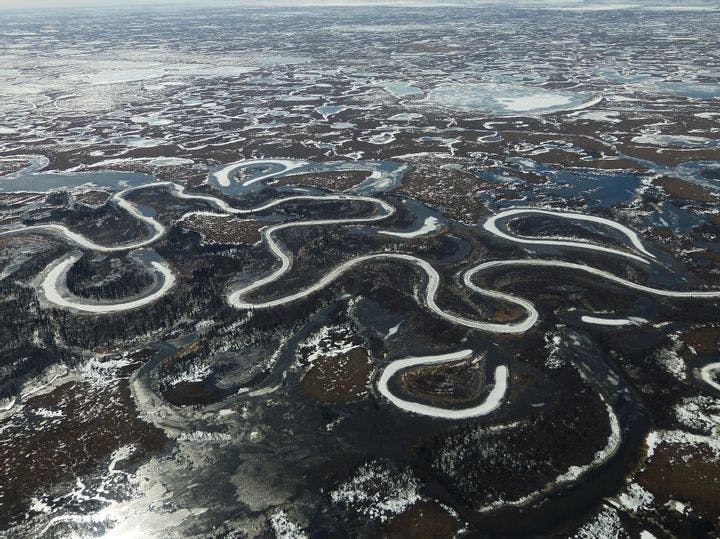How climate change is destroying a Native Alaskan religion
– Erin Amato
The village of Akiak already fell into the river, forcing the locals to gather their ancestors’ remains and construct a new grave.
In 2009, the U.S. Army Corps of Engineers listed Newtok, Alaska — population 345 — as a “priority action community.” The ground beneath the village is quickly slipping into the sea: Within just two years, some houses may be underwater. Thanks to climate change, residents are seeing storm surges intensify and permafrost thaw.
The ravages of climate change have forced the indigenous Yup’ik people to relocate to the vulnerable Yukon-Kuskokwim Delta, an area that once served as a Yup’ik summer hunting ground. Adding to this situation, these once-nomadic people now depend on the Delta for King Salmon as their main source of food – even as the local salmon population as plummeted.
In 2012, the Alaska Department of Fish and Game, alarmed by the decline in salmon populations, gathered a panel of fishery ecologists to determine the cause of the decline. Again, the culprit is climate change. Melting rivers send vulnerable juvenile salmon into the open ocean, while changing ocean currents spread diseases and alter the food chain. To protect the salmon from fishing, in addition to the harmful warming waters, state officials placed a ban on Delta fishing.
But fishing is central to the Yup’ik way of life. Believing the government threatened their way of life, Yupii fishermen pledged to defy this ban. They were quickly caught and found themselves in a crowded courtroom in Bethel, Alaska, where Adam Weymouth, a London-based freelance writer, catches up with them for The Atlantic.
In the courtroom, where a traditional Yup’ik mask stands next to the American flag, fisherman Felix Flynn takes the stand, guided by Attorney Jim Davis of the Northern Justice Project. “To start with, all I see is ocean,” Flynn told the court. “Then after a while there’s glassy water, and there’s other water that’s not glassy. And that means the herring are here. That’s what I learnt from my father. I'm subsistence. I was born and raised an Eskimo. It’s in my blood. It’s in my family blood.”
Flynn later explains his testimony about being “subsistence” refers to his life of living off the land. When prompted by his attorney about how it felt to not catch enough salmon, Flynn bursts into tears: “I have a grandchild, 2 years old [who kept asking] ‘when we gonna go check the net?’”
It’s not hard to see the connection between the fish and the indigenous belief system. In a court filing, Davis explained the beliefs of the Yup’ik: “If Yup’ik people do not fish for King Salmon, the King Salmon spirit will be offended and it will not return to the river.”
In court, the Yup’ik’s right to practice their ancestral traditions has been heralded as a First Amendment right. “Completely barring [them] from the salmon fishery thwarts the practice of a real religious belief,” an amicus brief by the American Civil Liberties Union states. “This cycle of interplay between humans and animals helped perpetuate the seasons; without the maintaining of that balance, a new year will not follow the old one.”
There might not be much time left as the Yup’ik way of life quickly melts: the village of Akiak already fell into the river, forcing the community to gather their ancestors’ remains and construct a new grave.
“Nobody here knows how many fish will come. Only the creator,” testifies fisherman Noah Okoviak. Despite his sincere beliefs and those of the Yup-ik, the judge ruled that the state had a significant reason to impose the fishing ban and that the fisherman had violated it. Most fishermen were required to pay $250 each over the course of a year or two.
Yet the fishermen continue their plea to practice their religion. Their case has been sent to the Alaskan Court of Appeals, who will hear their oral arguments this summer, Weymouth reports. They grasp for hope in previous court cases: A powerful precedent stands from the reversal of an indigenous hunter’s 1979 conviction for illegally transporting a newly slain moose needed for a religious ceremony.
Over the next decade, the Yup’ik people will continue to face the reality of relocation. But they seem poised to continue to fight to ensure their religious traditions do not erode as fast as their land.
The Source: “When Global Warming Kills Your God” by Adam Weymouth. The Atlantic, June 3, 2014.
Photo courtesy of the Yukon Delta National Wildlife Reserve/Kristine Sowl
